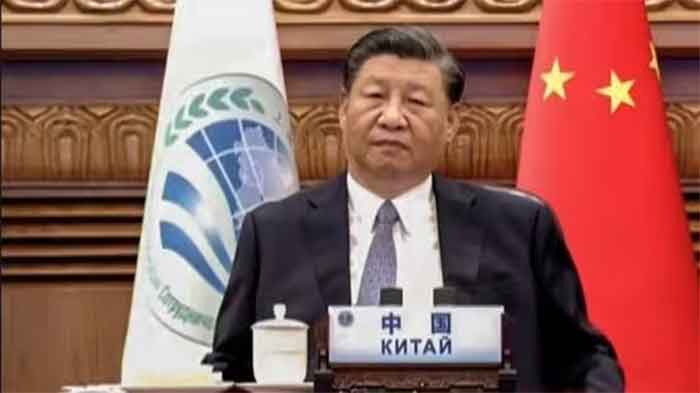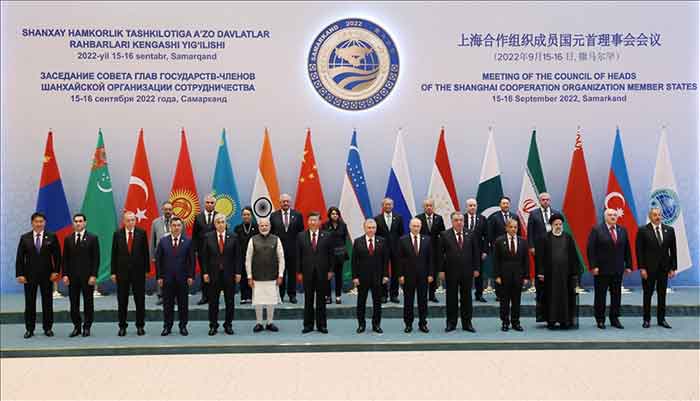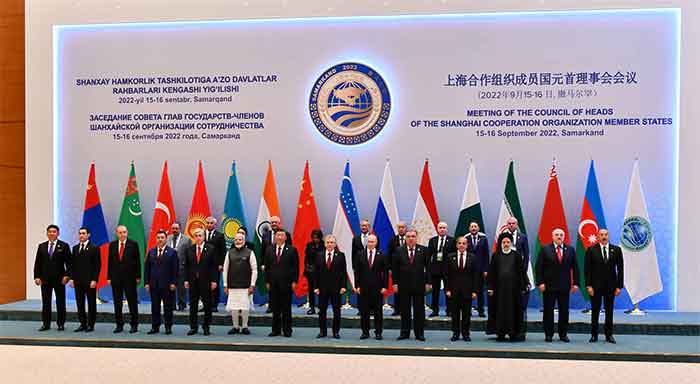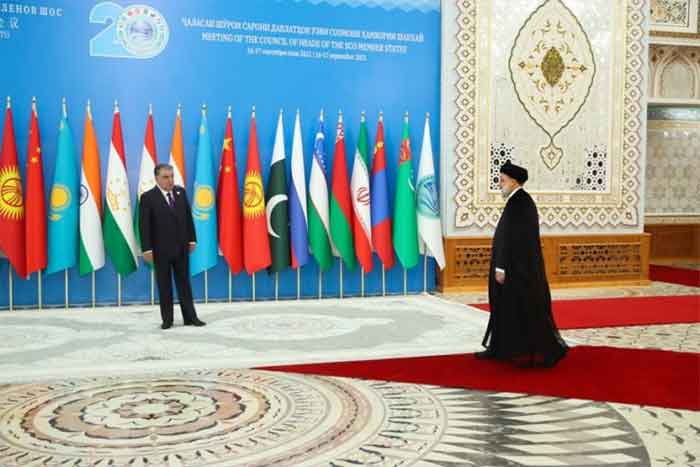
Members of the Shanghai Cooperation Organization (SCO) should resist outside attempts to stage uprisings, Chinese President Xi Jinping said on Tuesday in an address at the SCO’s virtual summit.
“It is necessary to categorically oppose any attempts to interfere from the outside and inspire color revolution under any pretext,” Xi stressed.
Media reports said:
During his speech at the summit, the Chinese leader also criticized the practice of imposing sanctions without UN approval, and called on SCO members to increase their trade in national currencies.
The 23rd SCO summit was chaired by Indian Prime Minister Narendra Modi. Summit participants include the presidents of Russia, China, Pakistan, Tajikistan, Uzbekistan, Kyrgyzstan, Kazakhstan, Iran, and Belarus.
The SCO is a Eurasian political, economic and security organization, which unites China, Russia, India, Kazakhstan, Kyrgyzstan, Pakistan, Tajikistan and Uzbekistan. It is currently world’s largest regional bloc in terms of geographic scope and population. The SCO, formed in the 1990s as the Shanghai Five, initially comprised China, Kazakhstan, Kyrgyzstan, Russia and Tajikistan. Uzbekistan joined in 2001, leading to the name change, and the most recent round of enlargement in 2017 saw India and Pakistan join. The SCO was expanded further during the current summit with the official inclusion of Iran. The rotating presidency of the SCO switches to Kazakhstan in September.
Xi spoke out against so-called ‘color revolutions’ on several occasions. Late last year, he stated that Beijing was “categorically opposed” to attempts to “undermine the peaceful life of people” under the guise of protecting human rights.
The term ‘color revolution’ has been used mainly to describe uprisings in post-Soviet states, with the goal of toppling governments that oppose the interests of the US and its allies, but has also been applied to countries outside the region. Most of the revolts have involved a large degree of support from U.S.-funded NGOs and American intelligence agencies.
The Rose Revolution in Georgia in 2003 and Ukraine’s Orange Revolution, which took place a year later, are two of the best-known examples.
Xi Jinping emphasized the importance of unity and “win-win” cooperation in a world “full of chaos” and “changes unseen in a century.”
He said: “We need to strengthen strategic communication and coordination, We must formulate foreign policies independently based on the overall and long-term interests of the region, and firmly hold the future and destiny of our country’s development and progress in our own hands.”
Antonio Guterres
Xi’s concerns resonated with United Nations Secretary-General Antonio Guterres, who had been invited by New Delhi to address the summit. He pointed out that “at a time when the world needs to work together, divisions are growing, and geopolitical tensions are rising.”
Russia Resisting Hostile Pressure, Says Putin
Russia is being targeted by foreign nations that have groomed a hostile neighbor at its doorstep then slapped Moscow with unprecedented economic sanctions, President Vladimir Putin said on Tuesday at the SCO summit. But it is successfully withstanding the pressure, he assured an audience of government officials.
“For a very long time, foreign forces implemented a project at our border, which turned our neighbor Ukraine into a de-facto hostile nation, an anti-Russia. They pumped it with weapons for eight years, turned a blind eye to the aggression against civilians in Donbass, fostered a neo-Nazi ideology,” the Russian leader explained.
Now the same players have bundled an unprecedented number of illegal, unilateral economic sanctions on Russia, he added. The goal of this “hybrid warfare” is to weaken the country economically in addition to threatening its security.
“Russia confidently withstands and will continue to withstand foreign pressure, sanctions and provocations. In these circumstances, our nations keep developing steadily,” he said.
The SCO is tackling multiple global issues, including “the degradation of the international security system, the rising risk of a new economic and financial crisis amid the unchecked accumulation of debt by developed nations social fracturing and growth of poverty, and the worsening food and environmental security,” said Putin.
He welcomed the bloc’s growing influence in global affairs and reputation in the world community. The fact that other nations pursue friendly relations with the SCO, by applying to join it, proves this, Putin said. Iran is set to become the ninth full member of the organization later in the day.
West’s Debt Addiction Could Trigger New Global Financial Crisis
The uncontrolled accumulation of debt by Western countries is increasing the risk of a new global financial crisis, Russian President Vladimir Putin warned on Tuesday.
Addressing the virtual summit from Moscow, the Russian leader cited global threats that could increase “conflict potential” in the near future.
“The risks of a new global economic and financial crisis are rising against the background of the uncontrolled accumulation of debt in developed countries, social stratification and growing poverty around the world, and deteriorating food and environmental security,” said Putin.
He emphasized that each of these problems is “complex and divisive in its own way,” but that when combined, they have fueled tensions around the world.
Last month, the executive director for Russia at the International Monetary Fund (IMF), Aleksey Mozhin, cautioned that Western economies are in critical condition due to high levels of public debt.
He accused wealthy states of implementing years of irresponsible budgetary and monetary policies, which eventually triggered the current debt crisis.
The UK and almost all EU countries are facing significant levels of debt, including France, Spain, Portugal, Greece, and Italy, according to Mozhin.
Putin, who spoke about his country resisting external sanctions and pressures, cited Russia-China trade and economic cooperation as a case in point to counter Western hegemony.
He said over 80% of trade settlements between the two nations are currently made in rubles and yuan – a bid to ditch the dollar – and urged other SCO members to follow suit. Moscow’s trade with SCO member states reached a record $263 billion last year, he added.
Modi Warns Against ‘Double Standards’ On Terrorism
Indian Prime Minister Narendra Modi said the SCO has emerged as a key platform for the peace, prosperity, and development of Eurasia as he opened the bloc’s summit on Tuesday.
“We do not see the SCO as an extended neighborhood, but rather as an extended family,” Modi said at the event, which is being hosted by New Delhi in a virtual format.
The Indian leader listed the pillars his country has focused on during its presidency of the SCO, including economic development, connectivity, unity, respect for sovereignty and territorial integrity, and environmental protection.
Modi congratulated Iranian President Ebrahim Raisi on joining the organization as its ninth full-fledged member, and welcomed the signing of a memorandum of obligation for SCO membership with Belarus.
The Indian leader spoke about cross-border terrorism, describing it as a threat to regional as well as global peace, and called for decisive action.
At the summit opening, Modi took a veiled swipe at neighbor and rival, Pakistan, citing cross-border terrorism as “the biggest threat to regional and global peace” while indirectly hinting that the country may be a safe haven for terrorists. The Indian leader sought decisive action against terrorism.
“Some countries use cross-border terrorism as an instrument of their policies and give shelter to terrorists. SCO should not hesitate to criticize such countries, there should be no double standards on terrorism” said Modi.
The Indian premier also urged the SCO leaders to work for the welfare of strife-torn Afghanistan and provide humanitarian aid to Kabul following the Taliban takeover two years ago. “Afghan soil should not be allowed to be used to destabilize its neighbors,” Modi added, possibly alluding to Pakistan, which is known to back the Taliban regime.
Pakistan
The Prime Minister of Pakistan Shehbaz Sharif, who had looked on intently during Modi’s opening remarks, broadly agreed with his Indian counterpart’s assertions, confirming that terrorism in all its forms and manifestations should be condemned in “clear and unambiguous terms.”
He opted not to engage in a discussion on state-sponsored terrorism and instead diverted attention away from Modi’s apparent criticisms.
Sharif said: “The hydra-headed monster of terrorism and extremism – whether committed by individuals, societies or states – must be fought with full vigor and conviction. Any temptation to use it as a cudgel for diplomatic point-scoring must be avoided under all circumstances.”
SCO Expands
Iran has become the ninth full member of the SCO, upgrading its previous status as an observer of the Eurasian security and economic development bloc.
The accession took place on Tuesday during a virtual meeting of SCO leaders, organized by India, which holds the rotating presidency.
Iran has been a participant at summits since 2005 and applied for full membership in 2021. Last November, Tehran’s parliament ratified a draft law on joining the alliance.
Putin hailed Iran’s swift progress to full SCO membership. The goal of the forum is now to “help our colleagues integrate into the multifaceted work” done by it, he added.
Talks are in progress to include English as the third language in the SCO Charter, as well as the existing Russian and Mandarin, said an Indian official connected to the summit.
Iran
Iran’s President Ebrahim Raisi renewed his call for greater de-dollarization, to further “intra-regional relations” and hailed the SCO as a symbol of “great family of civilizations.”
Belarus
Belarus is expected to sign a memorandum on accession, a necessary step for an observer country to become an SCO member. Minsk applied for the procedure last year during a summit in Uzbekistan.
Aside from Belarus, Afghanistan and Mongolia currently have observer status, while over a dozen nations are viewed by the SCO as dialogue partners.
SCO Adopt New Delhi Declaration
The leaders of the SCO have issued a joint statement on the adoption of the New Delhi Declaration, India’s foreign secretary Vinay Mohan Kwatra has announced. The statement reflects concerted efforts at countering radicalization and cooperation on digital transformation among the members, who reached consensus on ten resolutions to increase cooperation in the Eurasian region.
The document stresses the importance of building up coordinated efforts by the international community “to counter the activities of terrorist, separatist and extremist groups,” paying special attention to “preventing the spread of religious intolerance, aggressive nationalism, ethnic and racial discrimination, xenophobia, ideas of fascism, and chauvinism.”












































